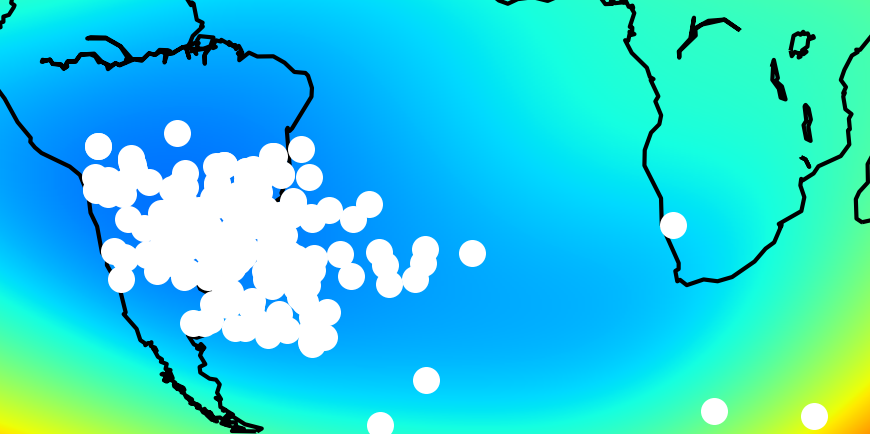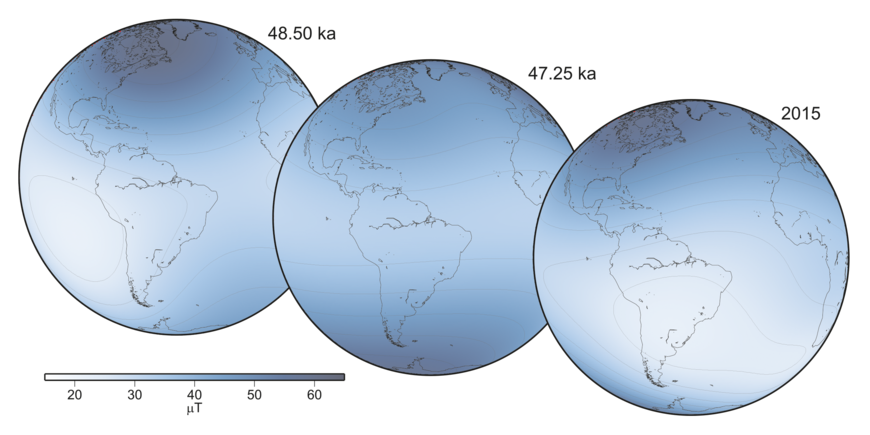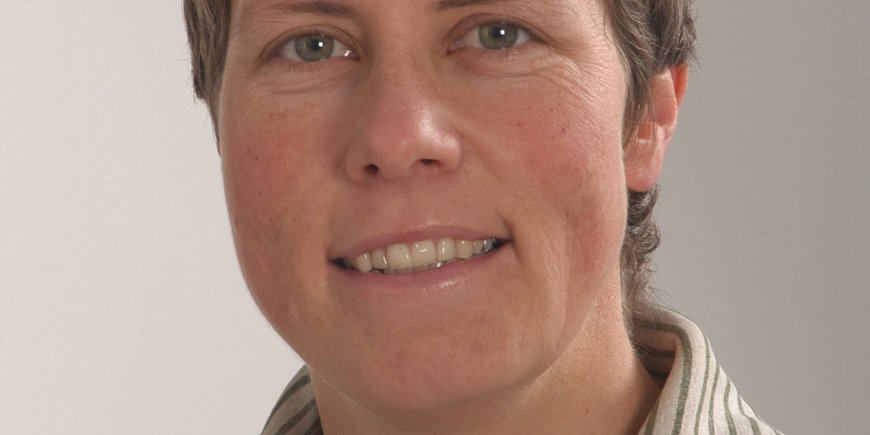Earth‘s magnetic field serves as a shield against hazardous radiation from space, especially the Sun’s charged particle flux. Since 1840, the year systematic measurements began, the global strength of the magnetic field has decayed at a rate of about five percent per century. Since that time, a significant anomaly of reduced magnetic strength has appeared over the South Atlantic: the South Atlantic Anomaly. Within the research community it is a subject of debate whether this anomaly is a sign of an imminent reversal of the Earth’s magnetic poles. Based on a reconstruction of the Earth’s magnetic field of the past, scientists from the Helmholtz Centre Potsdam - GFZ German Research Centre for Geosciences and the Universities of Iceland, Liverpool, and Nantes now show that the anomaly is probably not a precursor of a switching of the poles.
The area of the South Atlantic Anomaly is characterized by a significant reduction in the strength of Earth’s magnetic field compared with areas at similar geographic latitudes. Here, protection from harmful radiation from space is reduced. This leads, for example, to a higher rate of satellite communication blackouts or higher doses of radiation for passengers of long-distance flights.
Reversals of the Earth’s magnetic field have been common throughout Earth’s history. The process of a field reversal is accompanied by a reduction in field strength and reduced protection against hazardous radiation from space. Within their new study, published in Proceedings of the National Academy of Sciences of the United States of America PNAS, the scientists reconstructed past changes in Earth’s magnetic field using paleomagnetic data from sediment cores and volcanic rocks from across the globe. Magnetic minerals in the rocks and sediments “record” the orientation and strength of the Earth’s magnetic field at the time of rock formation. For the time interval of 50,000 to 30,000 years before present the data base is especially good, so that the scientists were able to model the changes of the magnetic field globally. During this time interval there were two occasions when weak magnetic field over the South Atlantic and South America resembled today’s field. In both cases the field strength in this region increased again after some time and the anomaly disappeared. The low intensity areas did notlead to a reversal of the poles.
41,000 years ago, a short-lived reversal of the poles occurred, the so-called Laschamp excursion. During this time, Earth’s magnetic field switched polarity for less than one thousand years, with the pole returning to its original polarity. At the beginning of the excursion, the field showed a significantly different pattern of reduced magnetic strength across Earth’s surface than today. Monika Korte, co-author of the study and team leader in the GFZ section Geomagnetism: “Based on our observations of the past 50,000 years we conclude that the South Atlantic Anomaly cannot be interpreted as a sign for the beginning of a reversal of the poles. Times of the past that, unlike the beginning of the Laschamp excursion, showed patterns of the magnetic field like today were not followed by a pole reversal. After some time the anomalies disappeared.” The scientists can, however, not say how long today’s anomaly will persist. It is possible that the strength of the field will further decay for several centuries. The last reversal of the poles towards today’s orientation took place 780,000 years ago. It may take thousands of years before the magnetic field reverses again.
Original study: Brown, M., Korte, M., Holme, R., Wardinski, I., Gunnarson, S., 2018. Earth’s magnetic field is probably not reversing. PNAS. DOI: 10.1073/pnas.1722110115
Contact:
Dr. Monika Korte
Helmholtz Centre Potsdam
GFZ German Research Centre for Geosciences
Section Geomagnetism
Behlertstraße 3a
14467 Potsdam
Phone: +49 331 288-1268
Email: monika.korte@gfz-potsdam.de
Ralf Nestler
Helmholtz Centre Potsdam
GFZ German Research Centre for Geosciences
Media and Communication
Telegrafenberg
14473 Potsdam
Phone: +49 331 288-1040
Email: ralf.nestler@gfz-potsdam.de










![[Translate to English:] Torsten Sachs in front of a climate station on a field](/fileadmin/_processed_/3/9/csm__TorstenSachs_bearbeitet_GS_4a1365ef84.jpeg)

![[Translate to English:] left image flood at the Ahrtal: image from above, several houses are flooded; left image:: Heidi Kreibich;](/fileadmin/_processed_/4/4/csm_Bild2_9af0130e9f.png)



![[Translate to English:] Start der Vega Rakete](/fileadmin/_processed_/6/4/csm_20231201-kachel_Vega-VV23-launch_ESA-CNES-Arianespace_706716b68c.jpeg)









![[Translate to English:] Poster exhibition at the Brandenburg Hydrogen Day at the GFZ, some participants in the foreground](/fileadmin/_processed_/6/5/csm_Erster_Brandenburgischer_Wasserstofftag_GFZ_402fcec95e.jpeg)
![[Translate to English:] Group picture of the participants](/fileadmin/_processed_/9/4/csm_20231108_CAWa-Workshop-Tashkent_Gruppenbild_99ea779d8a.jpeg)

![[Translate to English:] [Translate to English:] Hörsaal](/fileadmin/_processed_/e/6/csm_H%C3%B6rsal_e21ac645fb.jpeg)


![[Translate to English:] The Delegations in the Historic Library on the Telegrafenberg. In the back there are from left to right, the Dutch Ambassador for Germany, Ronald van Roeden, the Dutch Minister for Education, Culture and Science, Robbert Dijkgraaf and the scientific director of the GFZ, Susanne Buiter.](/fileadmin/_processed_/d/b/csm_Kachel-2_9eba4b4212.jpeg)

